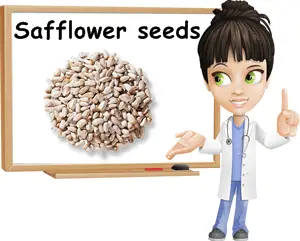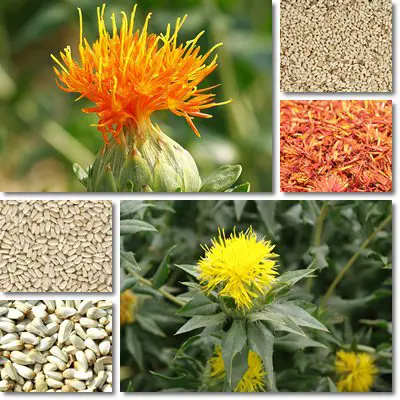Also known as false saffron, safflower (Carthamus tinctorius) is a proud member of the thistle family. Safflower seeds are the main source of vegetable safflower oil and a rich source of unsaturated fatty acids, notably Omega-9 and Omega-6.
Various clinical studies reported that a moderate safflower seed and oil consumption is beneficial for cardiovascular health, as long as there is also a healthy Omega-3 intake.
Another study suggests that a small to moderate consumption of safflower seeds is efficient in reducing belly fat especially in post-menopausal women. Preliminary research shows that safflower oil and seeds may help reduce insulin sensitivity, again in post-menopausal women, and lower both cholesterol levels and high blood pressure. At the same time, it is important to remember that one food does not make or break your diet.
Whatever the benefits you are looking to get when eating a certain food.

What does safflower look like?
The safflower plant looks very similar in appearance to an ordinary thistle plant, except for its bright yellow and orange flowers. Similar to thistles, safflower plants have deep roots which allow them to thrive in arid soils and regions with little rainfall. The plant can grow up to 1.5-2 meters in height and is known to have been cultivated since ancient times. Safflower flowers contain between 10 to 20 pale, pointy, white, edible seeds of no particular flavor, from which safflower seed oil, a vegetable oil commonly used for cooking, is made.
Safflower seed oil info
Safflower seed oil is the edible oil extracted from safflower seeds. Because safflower seed oil has little to no smell or taste, it has come to replace regular sunflower seed oil, canola oil, peanut oil and other types of relatively tasteless (or neutral-tasting), odorless oils in cooking. Although most of the safflower seed production goes into making safflower oil, a small part is sold for the production of food supplements. Dried or powder safflower flowers are used as a culinary spice.

What are the health benefits of Safflower Seeds?
Taking into account the nutritional profile of the seeds, the following 5 health effects stand out:
Rich in mono and polyunsaturated fatty acids
Safflower seeds are about 35% unsaturated fatty acids, mostly oleic (Omega-9) and linoleic (Omega-6) fatty acids. According to numerous studies focusing on the effects of dietary fatty acids on cardiovascular health, a diet rich in healthy unsaturated fatty acids, such as the Mediterranean diet, helps reduce cholesterol levels, regulates blood pressure and maintains blood vessels healthy and elastic due to the antioxidants properties of the fatty acids.
The key is to maintain a healthy ratio of 1:1 (ideal) or 1:3 Omega 3 to Omega 6 and 9 fatty acids. Including fatty acids in one’s diet diet, either in the form of olive oil, sunflower oil, linseed oil or safflower oil or in the form of walnuts, sesame seeds, sunflower seeds or safflower seeds can have positive effects on cardiovascular health and reduce mortality associated to cardiovascular disease by lowering high blood pressure and cholesterol levels.
Important source of B vitamins
Safflower seeds are an excellent source of thiamine, pyridoxine and folate.
- 90-100% of the RDI of vitamin B1 per 100 g
- 90% of the RDI of vitamin B6 per 100 g
- 40% of the RDI of vitamin B9 per 100 g of safflower seeds
In addition to ensuring good energy levels, safflower seeds help promote muscle tone, improve memory and concentration, protect the cells of the nervous system, support immunity, prevent Beriberi, anemia and paralysis and death in newborns.
Rich in iron, magnesium and phosphorus
- Iron: 4.90 mg (50% for adult males under 51, 25% for adult women under 51)
- Magnesium: 353 mg (over 100% for adult women, around 100% for adult males)
- Phosphorus: 644 mg (around 95% of the RDI for both men and women)
Safflower seeds are great against anemia, headaches and irritability. Moreover, they support muscle health, heart included, and increase calcium absorption in bones.
Last but not least, safflower seeds help ease magnesium deficiency symptoms such as eyelid twitching, muscle spasms, extrasystoles and high blood pressure, promote strong teeth and bones and support digestion.
Good for skin, hair and nails
Safflower seeds and oil in particular are rich in vitamin E and unsaturated fatty acids, two important compounds for skin and hair care.
The oil obtained from safflower seeds can be rubbed directly on nails to stimulate growth and moisturize the skin around the nails. Alternatively, it can be applied onto the scalp to nourish the skin and reduce redness, as well as to repair damaged hair and give it a healthy shine.
Great for reducing belly fat
According to several studies, daily consumption of small amounts of around 1-2 tablespoons of safflower seed oil led to a significant reduction in belly fat in post-menopausal women (read more about how to get rid of belly fat). This effect appears to have been caused by safflower seed oil regulating blood sugar levels and insulin response, which increased the body’s fat-burning response.
Overall, as seen by their nutritional value, safflower seeds are a great source of iron, magnesium and phosphorus, vitamins E, B1, B6 and B9 as well as unsaturated fatty acids.
A moderate consumption appears to have beneficial effects on cardiovascular health, support the activity of the nervous system as well as muscle health. The B vitamins and iron it provides further contribute to an improved energy metabolism and higher energy levels.
Side effects and contraindications of Safflower Seeds
There have been reports of allergic reactions to both safflower seeds and oil, which is why caution is required if you have never come into contact with the plant. If you suspect you may be allergic to safflower, avoid consumption until you’ve seen an allergist and have had a skin prick test or other examination to learn if you are really allergic to the plant. Also, according to ongoing research, pregnant women should avoid safflower seeds, flowers and oil because they may increase blood flow in the uterus and possibly lead to a miscarriage. Always consult a specialist first on matters of nutrition and health.
